First World War veteran Harry Patch, known as the Last Tommy, has died today aged 111.
This comes just one week after another British WWI veteran, Henry Allingham, died aged 113.
Harry was Britain's oldest man since Henry, also the world's oldest man, died.
Harry's death means there are now NO World War I veterans remaining in Britain.
The only remaining British veteran of the First World War is now Claude Choules, 108, who served in the Royal Navy and now lives in Perth, Australia.
Harry was born in 1898 and grew up in Combe Down near Bath.
He was a machine-gunner during the Great War, fighting at the 1917 Battle of Passchendaele.
Three of his comrades were killed by shrapnel during the battle after a shell exploded over their, and Harry's, heads.
Prime Minister Gordon Brown, Tory leader David Cameron, Chief of the General Staff, General Sir Richard Dannatt have paid their last respects.
Former England cricket star Jack Russell, who is also a painter and painted Harry's portrait, said :"The trenches, that era has passed now, our connection with it is gone."
Harry Patch, Britain's oldest man and the last survivor of the Great War trenches, dies aged 111
By Daily Mail Reporter
25th July 2009
Daily Mail
Harry Patch: 17th June 1898 - 25th July 2009
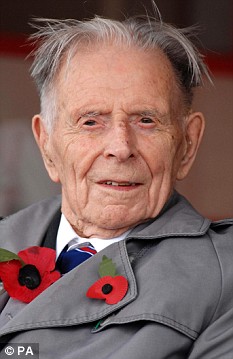
End of an era: Harry Patch, the last survivor of World War I to fight in the trenches, died this morning aged 111
The Prince of Wales and Prime Minister Gordon Brown led tributes to Harry Patch, the last surviving British soldier of the First World War, who died today at the age of 111.
Mr Patch, known as the Last Tommy, passed away peacefully just before 9am at Fletcher House nursing home in Wells, Somerset.
He had become Britain's oldest man for just a few days when another veteran of the war, Henry Allingham, died on July 18 aged 113.
Harry Patch was born in 1898. Here are some events that occurred in that year:
Mr Patch, a machine-gunner, served in the trenches as a private from June to September 1917 and fought in the battle of Passchendaele in which more than 70,000 British troops died.
Mr Patch was born on June 17 1898 and grew up in Combe Down, near Bath.
Prince Charles told the BBC: 'The Great War is a chapter in our history we must never forget, so many sacrifices were made, so many young lives lost.
'So today nothing could give me greater pride than paying tribute to Harry Patch from Somerset.
'Harry was involved in numerous bouts of heavy fighting on the front line but amazingly remained unscathed for a while.
'Tragically one night in September 1917 when in the morass in the Ypres Salient a German shrapnel shell burst overhead badly wounding Harry and killing three of his closest friends.
'In spite of the comparatively short time that he served with the Duke of Cornwall's Light Infantry Harry always cherished the extraordinary camaraderie that the appalling conditions engendered in the battalion and remained loyal to the end.'
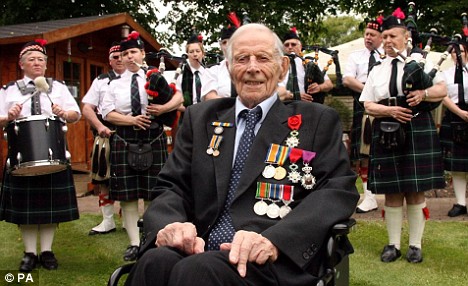
Birthday Boy: The last Tommy celebrated his 111th birthday last month at his care home with family, friends and a band of pipers
Prime Minister Gordon Brown said: 'I know that the whole nation will unite today to honour the memory, and to take pride in the generation that fought the Great War.
'The noblest of all the generations has left us, but they will never be forgotten.
'We say today with still greater force: "We will remember them".'
Conservative leader David Cameron said: 'The passing of our last surviving WWI soldier marks the end of an era and is a reminder of the huge debt of gratitude we owe Harry and those he served alongside.
'The sort of conditions they experienced and sacrifices they made are difficult for my generation to even imagine.
'We must never forget them and we will continue to fight for the values they fought for.'
Jim Ross, who regularly visited Mr Patch over many years, said on behalf of his closest friends: 'Harry died peacefully, surrounded by his many friends. While the country may remember Harry as a soldier, we will remember him as a dear friend.
'He was a man of peace who used his great age and fame as the last survivor of the trenches to communicate two simple messages: remember with gratitude and respect those who served on all sides; settle disputes by discussion, not war.
'To us he was as tender as a poppy. We should remember him, and the generation he came to represent, with great pride and affection.'
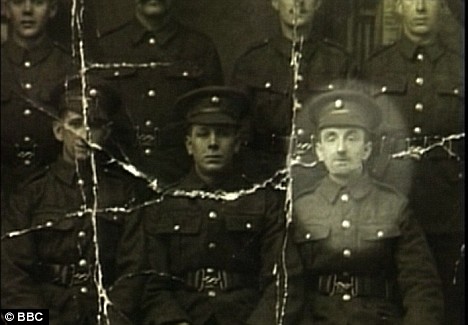
Over 90 years ago: A young Mr Patch posing with other WWI soldiers
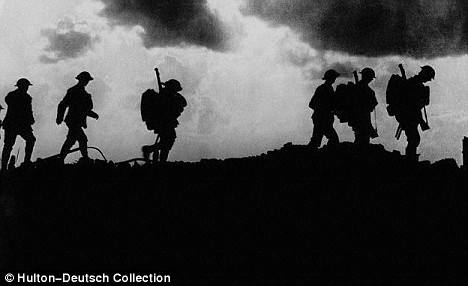
British troops march towards trenches near Ypres during the First World War. Mr Patch fought in the battle of Passchendaele - over 70,000 British soldiers died
Veterans Minister Kevan Jones said: 'Harry was a dignified and thoughtful representative of a brave and selfless generation.
'I am sure that I speak on behalf of veterans and serving members of our forces when I express my pride in his conduct as the last Tommy.'
Chief of the General Staff, General Sir Richard Dannatt, said: 'He was the last of a generation that in youth was steadfast in its duty in the face of cruel sacrifice and we give thanks for his life - as well as those of his comrades - for upholding the same values and freedom that we continue to cherish and fight for today.'
His biographer Richard Van Emden told the BBC: 'He had a sparkle about him, a dry sense of humour, he was just a lovely man. He was one of the most rewarding people to be with.'
Artist and former England wicketkeeper Jack Russell, who painted Mr Patch's portrait, said: 'The trenches, that era has passed now, our connection with it is gone.

Former England cricketer Jack Russell painted Mr Patch's portrait
'He was a generally quiet person but when he did say something it was often profound and you listened.
'Having him sit for me was a magical time, you knew you were talking to a man of experience.
'I think he was always thinking of the lads who died. I'm just pleased to have spent a few hours with him.
'A few years ago I just had a real urge to capture as many veterans as I possibly could.
'I didn't know why at the time but over the last few years they have all left us and I am so pleased that I got the chance to meet them and preserve their image, for me they will never die, they live on in the pictures.'
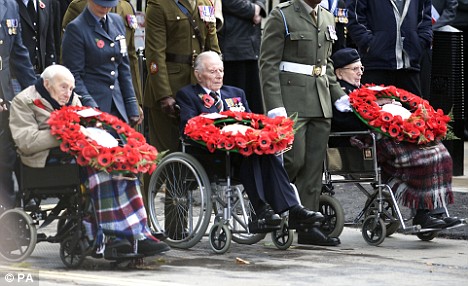
The final three: Mr Patch (centre) marks the 90th anniversary of the end of World War I last November. Henry Allingham (left) died only last week aged 113 and Bill Stone (right) died in January aged 108
Chief executive of Somerset Care, Andrew Larpent, said Mr Patch had been unwell for some time and had died peacefully in his bed.
He said: 'His friends and his family have been here. He just quietly slipped away at 9am this morning.
'It was how he would have wanted it, without having to be moved to hospital but here, peacefully with his friends and carers.'
A spokesman for the Ministry of Defence said Mr Patch's funeral will be held in Wells Cathedral and will focus on prayers for peace and reconciliation.
He said: 'The funeral cortege through Wells and the subsequent service at the Cathedral will be an opportunity for the people of this country to pay respect to Harry as the last representative of those who served in the trenches.'
Mr Patch joined two other veterans of the First World War - Mr Allingham and Bill Stone - to lay wreaths at the Cenotaph in central London on Armistice Day last November. All three men have now died.
At the time he said: 'I am very happy to be here today. It is not just an honour for me but for an entire generation. It is important to remember the dead from both sides of the conflict. Irrespective of the uniforms we wore, we were all victims.'
Mr Patch was staunchly anti-war, describing it as 'organised murder' but he did not come to the spotlight until he reached his 100th birthday.
As well as launching poppy appeals, he became an agony uncle columnist for lads magazine FHM and had a special edition cider named after him.
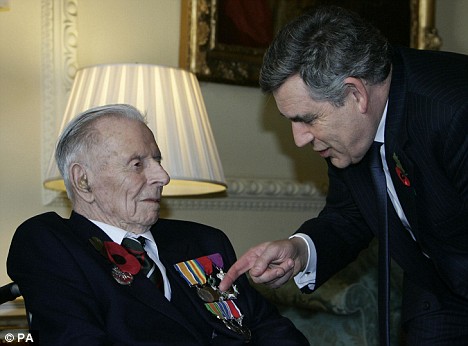
Honoured: Mr Patch talks to Gordon Brown during last November's Armistice anniversary reception for World War I veterans at 10 Downing Street
At the age of 105 Mr Patch re-visited the Ypres battle field and in 2004 he returned for a BBC series to meet a German veteran Charles Kuentz.
He also visited the British and German cemeteries, placing a wreath of poppies on one of the German graves.
His biography, The Last Fighting Tommy, was published in 2007.
Mr Patch left school at the age of 15 to train as a plumber.
He was 16 when war broke out and reached 18 as conscription was being introduced and after six months training he was sent to the frontline.
He was the number two in the Lewis gun team and his role was to carry and assemble the spare parts for the machine gun and ensure it worked.
The five gunners made a pact not to kill an enemy soldier if they could help it but they would instead aim for the legs.
On September 22 1917 a shell attack exploded above Mr Patch's head killing three of his comrades. Mr Patch was hit by shrapnel in the lower abdomen but survived.
During his recovery in Britain, he met his first wife, Ada, in 1918. They were married for almost 60 years and had two sons, Dennis and Roy, both of whom Harry has outlived.
Too old to fight in the Second World War Mr Patch became a maintenance manager at a US army camp in Somerset and joined the Auxiliary Fire Service in Bath.
After the war he went back to plumbing and retired in 1963.
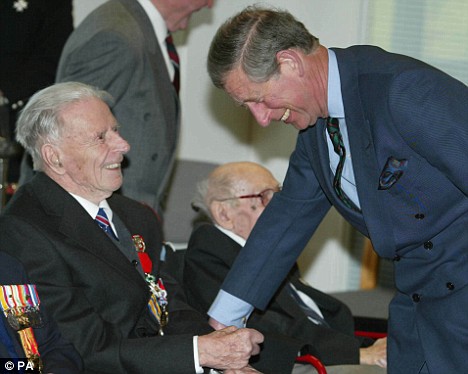
Sharing a joke: Mr Patch and Prince Charles in 2003. Charles today spoke of his 'greatest pride' in paying tribute to the veteran
Following Ada's death in 1976, at 81 Mr Patch married his second wife, Jean, who died five years ago. His third partner Doris, who lived in the same retirement home, died last year.
It was only on his 100th birthday that Mr Patch first came to the spotlight as one of the last veterans of the First World War, when for the first time reporters and television crews visited his care home in Wells, Somerset.
His autobiography, The Last Fighting Tommy, written with Richard van Emden, was published in 2007.
As well as launching poppy appeals, he became an agony uncle columnist for lads magazine FHM, had his portrait painted by artist and former England wicket keeper, Jack Russell, and had a special edition cider named after him.
In 1999 Mr Patch received the Legion D'Honneur medal awarded by the French government to 350 surviving First World War veterans who fought on the Western Front, dedicating it to his three fallen comrades.
At the age of 105 Mr Patch re-visited the Ypres battle field and in 2004 he returned for a BBC series to meet a German veteran Charles Kuentz.
He also visited the British and German cemeteries, placing a wreath of poppies on one of the German graves.
In February this year Poet Laureate Andrew Motion was commissioned to write a poem in Mr Patch's honour, entitled The Five Acts of Harry Patch.
In September 2008 he made his last trip to Langemark for the unveiling of a memorial.
Mr Patch believes 'war is organised murder' and said: 'It was not worth it, it was not worth one let alone all the millions.
'It's important that we remember the war dead on both sides of the line - the Germans suffered the same as we did.'
The only remaining British veteran of the First World War is now Claude Choules, 108, who lives in Perth, Australia. Mr Choules, originally from Worcestershire, served with the Royal Navy.
dailymail.co.uk
This comes just one week after another British WWI veteran, Henry Allingham, died aged 113.
Harry was Britain's oldest man since Henry, also the world's oldest man, died.
Harry's death means there are now NO World War I veterans remaining in Britain.
The only remaining British veteran of the First World War is now Claude Choules, 108, who served in the Royal Navy and now lives in Perth, Australia.
Harry was born in 1898 and grew up in Combe Down near Bath.
He was a machine-gunner during the Great War, fighting at the 1917 Battle of Passchendaele.
Three of his comrades were killed by shrapnel during the battle after a shell exploded over their, and Harry's, heads.
Prime Minister Gordon Brown, Tory leader David Cameron, Chief of the General Staff, General Sir Richard Dannatt have paid their last respects.
Former England cricket star Jack Russell, who is also a painter and painted Harry's portrait, said :"The trenches, that era has passed now, our connection with it is gone."
Harry Patch, Britain's oldest man and the last survivor of the Great War trenches, dies aged 111
By Daily Mail Reporter
25th July 2009
Daily Mail
Harry Patch: 17th June 1898 - 25th July 2009

End of an era: Harry Patch, the last survivor of World War I to fight in the trenches, died this morning aged 111
The Prince of Wales and Prime Minister Gordon Brown led tributes to Harry Patch, the last surviving British soldier of the First World War, who died today at the age of 111.
Mr Patch, known as the Last Tommy, passed away peacefully just before 9am at Fletcher House nursing home in Wells, Somerset.
He had become Britain's oldest man for just a few days when another veteran of the war, Henry Allingham, died on July 18 aged 113.
Harry Patch was born in 1898. Here are some events that occurred in that year:
- The Spanish-American War takes place. The United States wanted Spain to grant independence to Cuba and then the US takes control of the Phillippines, Puerto Rico and Guam.
- British and Egyptian troops led by Kitchener defeat Sudanese tribesmen during the Battle of Omdurman, adding the Sudan to the British Empire. Sudan gained its independence from Britain in 1956.
- The Fashoda Incident takes place between Britain and France, the climax of imperial territorial disputes in Africa. The dispute almost brings the two countries to war, but it ends in a diplomatic victory for the British.
- The British conquer and burn Nigeria's Benin City, destroying much of the country's treasured art. "Benin Bronzes", portrait figures, busts, and groups created in iron, carved ivory, and brass, were taken from the city by the British and are displayed in museums around the world. The British auctioned some of the bronzes to cater for their expenses incurred during the invasion of the city.
- The United States annexes Hawaii, which was previously an independent nation in its own right. Five years earlier, the US got rid of Hawaii's Queen Lili'uokalani and forced it into becoming a republic.
- Robert Allison of Port Carbon, Pennsylvania becomes the first person to buy an American-built automobile
- The first games of the Italian Football League are played.
- The first ever photographs of the Turin Shroud are taken.
- British engineer Henry Bessemer, who gave his name to the Bessemer process for the manufacture of steel, dies aged 85.
Mr Patch, a machine-gunner, served in the trenches as a private from June to September 1917 and fought in the battle of Passchendaele in which more than 70,000 British troops died.
Mr Patch was born on June 17 1898 and grew up in Combe Down, near Bath.
Prince Charles told the BBC: 'The Great War is a chapter in our history we must never forget, so many sacrifices were made, so many young lives lost.
'So today nothing could give me greater pride than paying tribute to Harry Patch from Somerset.
'Harry was involved in numerous bouts of heavy fighting on the front line but amazingly remained unscathed for a while.
'Tragically one night in September 1917 when in the morass in the Ypres Salient a German shrapnel shell burst overhead badly wounding Harry and killing three of his closest friends.
'In spite of the comparatively short time that he served with the Duke of Cornwall's Light Infantry Harry always cherished the extraordinary camaraderie that the appalling conditions engendered in the battalion and remained loyal to the end.'

Birthday Boy: The last Tommy celebrated his 111th birthday last month at his care home with family, friends and a band of pipers
Prime Minister Gordon Brown said: 'I know that the whole nation will unite today to honour the memory, and to take pride in the generation that fought the Great War.
'The noblest of all the generations has left us, but they will never be forgotten.
'We say today with still greater force: "We will remember them".'
Conservative leader David Cameron said: 'The passing of our last surviving WWI soldier marks the end of an era and is a reminder of the huge debt of gratitude we owe Harry and those he served alongside.
'The sort of conditions they experienced and sacrifices they made are difficult for my generation to even imagine.
'We must never forget them and we will continue to fight for the values they fought for.'
Jim Ross, who regularly visited Mr Patch over many years, said on behalf of his closest friends: 'Harry died peacefully, surrounded by his many friends. While the country may remember Harry as a soldier, we will remember him as a dear friend.
'He was a man of peace who used his great age and fame as the last survivor of the trenches to communicate two simple messages: remember with gratitude and respect those who served on all sides; settle disputes by discussion, not war.
'To us he was as tender as a poppy. We should remember him, and the generation he came to represent, with great pride and affection.'

Over 90 years ago: A young Mr Patch posing with other WWI soldiers

British troops march towards trenches near Ypres during the First World War. Mr Patch fought in the battle of Passchendaele - over 70,000 British soldiers died
Veterans Minister Kevan Jones said: 'Harry was a dignified and thoughtful representative of a brave and selfless generation.
'I am sure that I speak on behalf of veterans and serving members of our forces when I express my pride in his conduct as the last Tommy.'
Chief of the General Staff, General Sir Richard Dannatt, said: 'He was the last of a generation that in youth was steadfast in its duty in the face of cruel sacrifice and we give thanks for his life - as well as those of his comrades - for upholding the same values and freedom that we continue to cherish and fight for today.'
His biographer Richard Van Emden told the BBC: 'He had a sparkle about him, a dry sense of humour, he was just a lovely man. He was one of the most rewarding people to be with.'
Artist and former England wicketkeeper Jack Russell, who painted Mr Patch's portrait, said: 'The trenches, that era has passed now, our connection with it is gone.

Former England cricketer Jack Russell painted Mr Patch's portrait
'He was a generally quiet person but when he did say something it was often profound and you listened.
'Having him sit for me was a magical time, you knew you were talking to a man of experience.
'I think he was always thinking of the lads who died. I'm just pleased to have spent a few hours with him.
'A few years ago I just had a real urge to capture as many veterans as I possibly could.
'I didn't know why at the time but over the last few years they have all left us and I am so pleased that I got the chance to meet them and preserve their image, for me they will never die, they live on in the pictures.'

The final three: Mr Patch (centre) marks the 90th anniversary of the end of World War I last November. Henry Allingham (left) died only last week aged 113 and Bill Stone (right) died in January aged 108
Chief executive of Somerset Care, Andrew Larpent, said Mr Patch had been unwell for some time and had died peacefully in his bed.
He said: 'His friends and his family have been here. He just quietly slipped away at 9am this morning.
'It was how he would have wanted it, without having to be moved to hospital but here, peacefully with his friends and carers.'
A spokesman for the Ministry of Defence said Mr Patch's funeral will be held in Wells Cathedral and will focus on prayers for peace and reconciliation.
He said: 'The funeral cortege through Wells and the subsequent service at the Cathedral will be an opportunity for the people of this country to pay respect to Harry as the last representative of those who served in the trenches.'
Mr Patch joined two other veterans of the First World War - Mr Allingham and Bill Stone - to lay wreaths at the Cenotaph in central London on Armistice Day last November. All three men have now died.
At the time he said: 'I am very happy to be here today. It is not just an honour for me but for an entire generation. It is important to remember the dead from both sides of the conflict. Irrespective of the uniforms we wore, we were all victims.'
Mr Patch was staunchly anti-war, describing it as 'organised murder' but he did not come to the spotlight until he reached his 100th birthday.
As well as launching poppy appeals, he became an agony uncle columnist for lads magazine FHM and had a special edition cider named after him.

Honoured: Mr Patch talks to Gordon Brown during last November's Armistice anniversary reception for World War I veterans at 10 Downing Street
At the age of 105 Mr Patch re-visited the Ypres battle field and in 2004 he returned for a BBC series to meet a German veteran Charles Kuentz.
He also visited the British and German cemeteries, placing a wreath of poppies on one of the German graves.
His biography, The Last Fighting Tommy, was published in 2007.
Mr Patch left school at the age of 15 to train as a plumber.
He was 16 when war broke out and reached 18 as conscription was being introduced and after six months training he was sent to the frontline.
He was the number two in the Lewis gun team and his role was to carry and assemble the spare parts for the machine gun and ensure it worked.
The five gunners made a pact not to kill an enemy soldier if they could help it but they would instead aim for the legs.
On September 22 1917 a shell attack exploded above Mr Patch's head killing three of his comrades. Mr Patch was hit by shrapnel in the lower abdomen but survived.
During his recovery in Britain, he met his first wife, Ada, in 1918. They were married for almost 60 years and had two sons, Dennis and Roy, both of whom Harry has outlived.
Too old to fight in the Second World War Mr Patch became a maintenance manager at a US army camp in Somerset and joined the Auxiliary Fire Service in Bath.
After the war he went back to plumbing and retired in 1963.

Sharing a joke: Mr Patch and Prince Charles in 2003. Charles today spoke of his 'greatest pride' in paying tribute to the veteran
Following Ada's death in 1976, at 81 Mr Patch married his second wife, Jean, who died five years ago. His third partner Doris, who lived in the same retirement home, died last year.
It was only on his 100th birthday that Mr Patch first came to the spotlight as one of the last veterans of the First World War, when for the first time reporters and television crews visited his care home in Wells, Somerset.
His autobiography, The Last Fighting Tommy, written with Richard van Emden, was published in 2007.
As well as launching poppy appeals, he became an agony uncle columnist for lads magazine FHM, had his portrait painted by artist and former England wicket keeper, Jack Russell, and had a special edition cider named after him.
In 1999 Mr Patch received the Legion D'Honneur medal awarded by the French government to 350 surviving First World War veterans who fought on the Western Front, dedicating it to his three fallen comrades.
At the age of 105 Mr Patch re-visited the Ypres battle field and in 2004 he returned for a BBC series to meet a German veteran Charles Kuentz.
He also visited the British and German cemeteries, placing a wreath of poppies on one of the German graves.
In February this year Poet Laureate Andrew Motion was commissioned to write a poem in Mr Patch's honour, entitled The Five Acts of Harry Patch.
In September 2008 he made his last trip to Langemark for the unveiling of a memorial.
Mr Patch believes 'war is organised murder' and said: 'It was not worth it, it was not worth one let alone all the millions.
'It's important that we remember the war dead on both sides of the line - the Germans suffered the same as we did.'
The only remaining British veteran of the First World War is now Claude Choules, 108, who lives in Perth, Australia. Mr Choules, originally from Worcestershire, served with the Royal Navy.
dailymail.co.uk
Last edited: